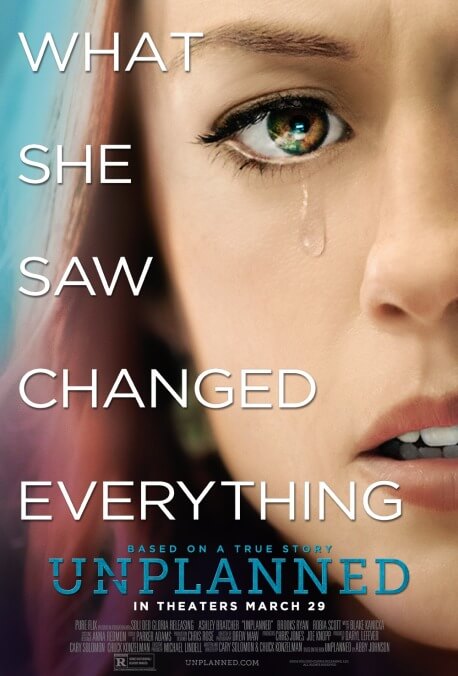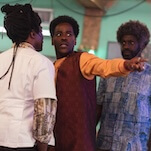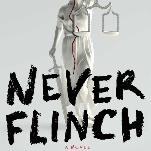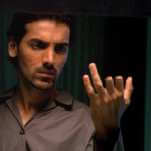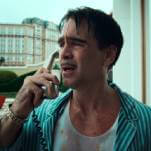In recent years, the faith-based production company Pure Flix has softened from the fire-and-brimstone fundamentalism of God’s Not Dead and its successors to duller, more mild-mannered fare (including, recently, a barely noticed version of Little Women). Mike Lindell is here to bring things back to noxious basics. The anti-abortion Christian drama Unplanned is the first of three films being (partially or wholly) financed by the Trump-supporting entrepreneur and MyPillow founder. It climaxes with a Planned Parenthood office having its sign torn down; Lindell is in the bulldozer’s seat. “I’ve been waiting for this my whole life,” he says, grinning in a hard hat with the American flag on it—mirroring the TV ads for his product, where Lindell wears a crucifix, and the “call now” screen has an American flag with “Made in the U.S.A.” written underneath.
Little did Abby (Ashley Bratcher) realize she was working for an abortion-for-profit enterprise. Perhaps she should have picked up on it when first meeting her boss, Cheryl (Robia Scott, vaguely aspiring towards Demi Moore), whose rudeness is a dead giveaway that she just wants to harvest fetuses. Even before that, Abby might have listened to the same nagging voice that told her to avoid telling her mother (Robin De Marco) about her job. (As Abby’s voiceover says, “Never trust a decision you don’t want your mom to know about.” Really terrible advice, that.) Cheryl—who shows Abby aborted fetuses as if revealing the lost Ark, an evil grin fixed on her face—lets the mask drop completely during a climactic scene. “Fast food outlets look to break even on the hamburgers they sell,” she hisses. They make money on fries and soda, “the low-cost, high-margin items. Abortion is our fries and soda. Abortion is what pays your salary.”
Besides pantomime-villainy characterization, Unplanned has several other modes of attack. One is good ol’ fashioned scare tactics. There are shots of blood pooling in the socks of abortion recipients post-op; an overhead view of Abby after her second (RU-486 induced) abortion, sprawled out in a bathroom covered in streaks of gore, as if she were the final-girl survivor in a slasher movie; and an actual abortion sequence. It’s the last of these that was the inciting incident for Johnson’s conversion. (Allegedly—her story doesn’t match the records.) She’d never been in the operating room before during surgery, but watching the ultrasound of a fetus kicking to not get sucked out of the womb freaked her out. For this image, Unplanned received an R rating, which seems overly harsh for a cartoonish sequence in which the rendering has the fetus’ hands grasping for dear life onto the uterine walls. The overegging undermines whatever horrific effect this conversion moment is supposed to have.
Unplanned’s third angle of attack is to trot out a number of pro-life talking points, none of which are new—this is more like an anthology of loathsome and/or disingenuous tropes than a fresh batch. Typical example: A protester outside Abby’s facility aligns the crusade against abortion with slavery, the Holocaust, and the Civil Rights movement as examples of what happens when a whole group is denied its humanity. That’s a lot, obviously, but it’s certainly not new: To dilate on the middle point, the Holocaust has been invoked as a reference point since 1970. Some pro-lifers have taken that point very seriously, like the two young men who bombed a Pensacola abortion clinic on Christmas Day, 1984, as “a gift to Jesus on his birthday.” Their attorney’s defense was that “if they had sabotaged concentration camps, they would be heroes.”
If Unplanned has a point beyond preaching to the converted, it’s to whitewash and separate “responsible” members of the pro-life movement from its outliers. Johnson’s thesis is that not all abortion providers are evil people and should not be vilified as such—they’re merely wrong, and what’s needed is the peaceful but permanent banning of abortion. Furthermore, who could object to a group of people quietly and respectfully praying outside a clinic? They’re not the ones screaming and frothing at the mouth, a few bad apples, etc. Unplanned reaches its disingenuous nadir when a representative from 40 Days For Life explains that they’re videotaping their exchanges just in case someone wrongly accuses them of violence—they have to have the cars, and their license plates, in frame just for the record. What this explanation covers for is a long history of license plate numbers being recorded and used to locate mailing addresses, with women subsequently receiving letters from the protesters.
There’s lots more to object to in Unplanned. A subplot reinforces the importance of submission to one’s husband via its portrait of Abby’s patient, perfect spouse, Doug (Brooks Ryan), who’s always wiser than his wife, down to realizing she’s pregnant before she does. (Takeaway: Men know women’s bodies better than they do.) All speaking parts are for white people, with the exception of two black women who come to get abortions, one with her family praying and weeping for her outside the fence—a dog whistle for the folks who believe legalized abortion is just pursuing Margaret Sanger’s goal of using birth control as a way to euthanize African-Americans. Insofar as there is a formal level to this slab of CBN after-school propaganda, Unplanned has greater technical finesse than its foundational forebears. The performances don’t seem like those delivered by actors confused by dialogue read from teleprompters, and the shot choices are logical rather than insanely clunky. But there’s not a single scene that speaks to characters with lives outside their streamlined narrative function; they’re performers in a parable traced over a Chick tract, filmed with a bland competence at odds with the true perversity of the material. Old-school Pure Flix: Welcome back!
